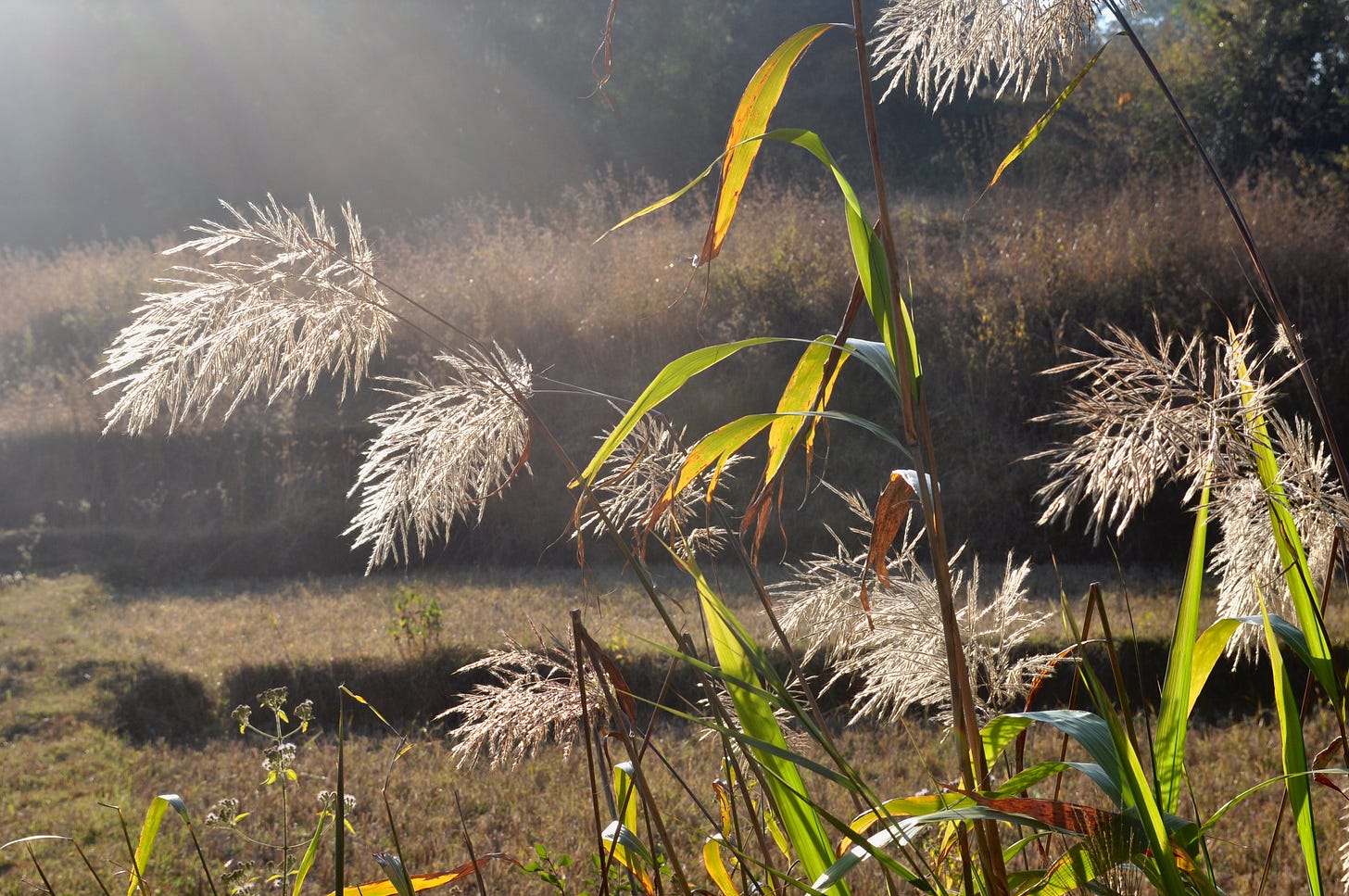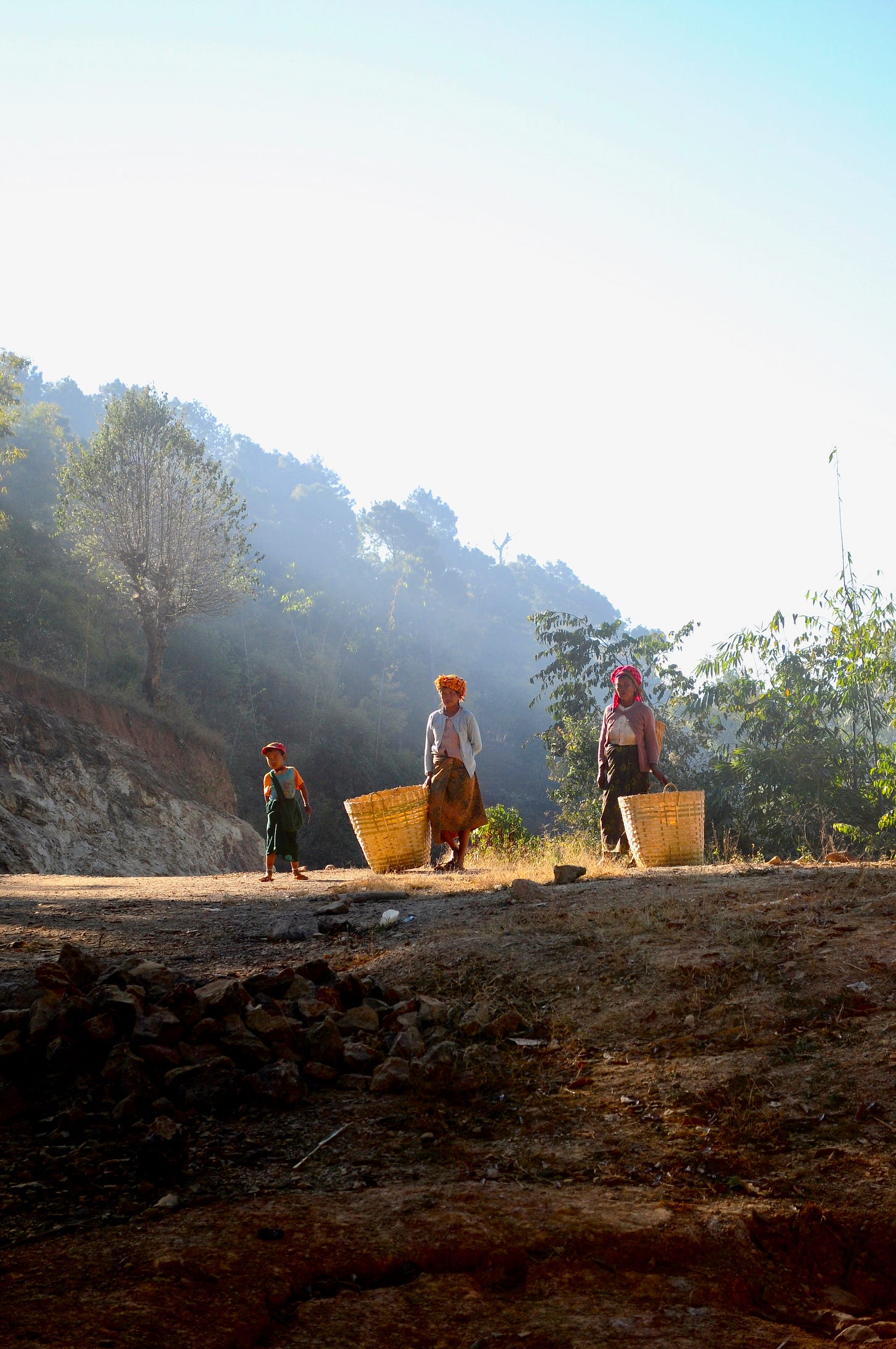She Could Tell the Weather by Looking at the Sky at Dawn
Lessons about families and heritage from working with Myanmar's rural women
Hello friends,
It has been another one of these weeks. And during all the ups and downs, my mind turned to working with women farmers in Myanmar, which at the time felt hard, yet in retrospect seems important, not only for the impact of the work we did, but for the friendships and solidarity we shaped along the way.
When I worked with women in Myanmar, they often told me stories of what their mothers and grandmothers knew, which they had forgotten.
My mother could tell the weather by looking at the sky at dawn. She is illiterate but she knew about that, one of my colleagues told me.
The woman who told me this, grew up in a village in a remote region of Myanmar. She told me stories of a childhood sharing a bed with seven siblings, climbing in trees, living under an authoritarian regime during a long-running civil war.
Despite the fact I grew up in a suburb of Glasgow, in a very different political environment, playing football on the street and sharing a room with my brother - me and that friend seemed to have more in common than we had different, and we would spent time, while we were meant to be working, swapping ideas and laughing at each other in the kindest of ways.
When I asked her about her cultural traditions, she would tell me about the ways she thought women upholding local cultures in her region were not empowered. She had left home to get a Master’s degree from a foreign university and she wanted gender equality before tradition. She would also tell me about her mother and all the things she had taught her, which she did not do.
Other friends told me that when they were sent to secondary school outside their villages, they lost the opportunity to learn about traditional medicine or collecting food from their aunts and grandmothers. By learning in the formal education system, they felt they had also lost contact to their culture. So now they researched these traditions, to try to reclaim them, while working in the city far from their birthplaces.
I also worked far from my country of birth. And I would also tell them of my Grannie who lived on an island or my other ancestors, as far back as I knew, who used to farm in Scottish hills, before moving to Glasgow or being cleared out (desperately searching in the Burmese dictionary for the word ‘sheep’). And like them, I studied and learned in books to piece together a hertiage I should know.
During the years I worked in Myanmar I heard many stories about these transitions from upbringings to new understandings. The strange ambiguity and nostalgia my friends felt about where they now found themselves. An ambiguity and nostalgia I also felt about my own inheritances.
Grappling with the duality of valuing heritage, while pushing back against aspects of culture that constrained them. Grappling with the ways tradition and progress coexist: negotiating these changes as a personal as well as a collective process.
And like them, I sought to forget ways I had been conditioned to be as a girl by my culture. Like them, I wasn’t sure what I wanted to take forward from the generations before me.
It stuck me how this process is repeated around the world. Unimaginative colonial practices implemented over and over. State education given value over local knowledge. Forcing us to choose one lens through which to understand the world, instead of standing somewhere in this ambiguity. As if there is only one type of progress, not myriads of imaginable ways we could grow.
In Scotland, this process now seems unavoidable. A necessary part of history. My ancestors moving on what seems a now pre-ordained journey from rural to urban lives. The daily changes for women which came with technology and rights, the quiet inequalities still silently passed down, so my grandmother taught me to be quiet, while fighting her own tendancies for loud debate.
In Myanmar, it was more like a question. People still navigating forests like friends, not everyone willing to exchange tradition for what the modern world was offering. And people like my friend who was walking a path she was constructing under her own feet.
She showed me, that there were many ways to negotiate being a woman in the world. That it was ok to still be connected to the tendancies of your upbringing, to be still held, comforted and even constrained by who you were taught to be, while also, be shaping a culture and journey of your own.
A moment to mention the conflict in Myanmar
I have not mentioned any names or identifying details in this essay, because of the ongoing conflict in Myanmar which affects the women I write about. Studies show Myanmar to be the country facing the highest level of conflict worldwide (and the second deadliest - after Ukraine).
Since the coup d’etat in 2021, over 50,000 people have lost their lives and over 20,000 people have been imprisoned for their political beliefs. Much of conflict happens in the remote ethnic states, like the ones I write about here.
And I also know that British colonial occupation, in which Scots played a role, still plays out in Myanmar today. It might be happening over there - but the events, in what can seem a very distant country, is linked in many ways to our lives and our history.
That is not to cast blame, but to remember, that we live in connected and unequal world systems.
Travel With Me
If this resonated with you, I would love to hear from you. Tell me:
How do you negotiate your connections to culture versus progress?
What ambigious journey are you shaping?







This resonates with me deeply: no matter how different our backgrounds may seem, we are more similar than we think.
I too have wrestled with the dissonance between the education I received and the cultural values my upbringing attempted—sometimes unsuccessfully—to pass down to me.
Now, I find myself constantly navigating which values I want to pass on to my children and which generational traumas I am determined to break.
It’s a complex journey, not only in these globally connected times but especially for those of us raised multilingual and multicultural within immigrant families, who have since become migrants ourselves, raising yet another multicultural generation.
This is so fascinating and really makes you think. Love the photos as well.